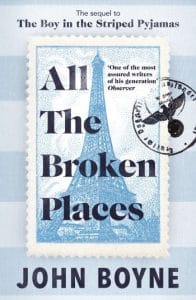All the Broken Places
reviewed by Wendy Tucker
All the Broken Places is a sequel, of sorts, to the best-selling Boy in the Striped Pyjamas that, like Markus Zusak’s The Book Thief, was originally published as Young Adult Fiction but both books quickly became best-selling novels in the adult fiction category and both were made into successful films. Both are set during the Holocaust of WW2. Both authors felt that Young Adult readers should know about the Holocaust and both were criticised by survivors for a too soft approach. That judgement is up to the reader.
All the Broken Places is very much adult fiction and stands alone, you don’t need to have read the previous novel. As Boyne himself said, ‘Revisiting characters from an earlier work can be a risky but exhilarating experience for a novelist, particularly if those characters come from the best-known book of one’s career.’
That risk was certainly worth taking. This novel focuses on Gretel, the then twelve-year old sister of Bruno from The Boy in the Striped Pyjamas. Gretel is now 91 years old and Bruno’s grieving sister. She is in excellent health and living very comfortably in a flat in exclusive Mayfair, London and she is our guilt- ridden narrator.
Boyne skilfully takes us back to her memories of Auschwitz, her father the Commandant, her mother, her part in her brother’s death and the question of how much culpability should be laid on a twelve-year old. What did she know? How much did she understand? Should she have come forward, as the daughter of one of the most infamous Nazis, and named names and helped get justice for the victims? Or, as she does, live a new life with a new identity? But her life is never free from memories, the fear of discovery and retribution, and often overwhelming guilt. As one character says, ‘By doing nothing, you did everything. By taking no responsibility, you bear all responsibility.’ This is the theme of the novel … and perhaps it is a theme for present times.
Gretel moves from post-war France to Australia and, finally, to England. She is a fine, gutsy narrator and the keeper of dark and terrible secrets. Finally, Gretel has a chance of atonement when she befriends a young boy, whose life is endangered by a brutal father. Will she risk everything to save him and atone for the death of her brother and her decades of silence?
Boyne has written a stunning novel of grief, complicity, revenge and atonement.


